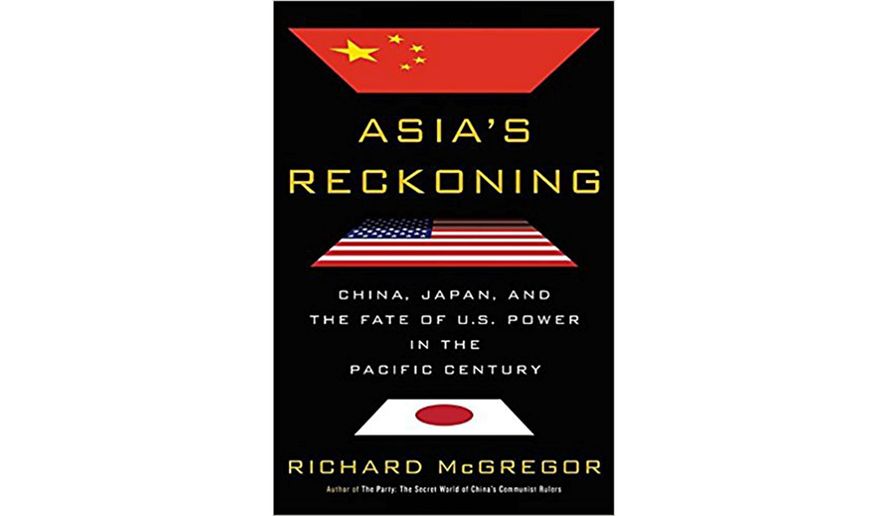OPINION:
ASIA’S RECKONING: CHINA, JAPAN, AND THE FATE OF U.S. POWER IN THE PACIFIC CENTURY
By Richard McGregor
Viking, $28, 416 pages
East and South Asia have been more prone to wars over sovereignty issues than any other region in the world since World War II. India-Pakistan and China-India conflicts were frequent in the 1960s. Communist countries in East Asia have not been immune from fighting each other. Soviet Russia and China clashed in border disputes, as have Vietnam and China.
The United States has generally steered clear of these neighborhood clashes, but the lingering dispute between Japan and China over the Senkaku (Diaoyu to the Chinese) Islands is one in which the United States will almost inevitably become involved if Japan and China come to blows. As Richard McGregor points out in “Asia’s Reckoning,” such a conflict would be economically catastrophic not just for those three nations, but for the world.
Most Americans view our relationship with those two countries fairly simplistically. Japan was a Cold War ally, and China was a bitter adversary until Richard Nixon and Henry Kissinger unfroze relations with it in the 1970s. Since then, U.S. relations with China have varied between cool and hostile. The reality is much more complicated and the author tries to explain the twists and turns of our tangled relationships with both countries.
Something I did not know until reading the book was how much Henry Kissinger despised dealing with Japan. It is hard in the second decade of this century to remember that the Japan of the last years of the Cold War was viewed as an economic giant capable literally of buying and selling an economically declining America. Mr. McGregor does a good job of explaining Japan’s sudden fall from economic superpower status and how its unstable internal politics have frustrated American diplomats who have tried to deal with it.
Mr. Kissinger generally found the Chinese to be much easier to cope with. Japan’s wild political mood swings from ultra-conservative to near socialist have been much harder for American presidents from Nixon to Obama to sort out; on the other hand, post-Cultural Revolution China has seemed much more stable. Mr. McGregor explains how the Chinese illusion of stability is merely a paper wall shielding the international customers from the kitchen where the ugly sausage-making takes place.
He also does a good job of tracing the Sino-Japanese relationships since the 19th century. Neither nation has ever viewed the other as an equal partner or competitor. Both have seen the relationship as zero sum gain, and continue to do so.
Mr. McGregor shows that U.S. diplomats and military strategists have deftly played the Sino-Japanese rivalry in the Pax Americana period since the end of the Cold War. However, he is concerned that the tightrope is becoming frayed and that if it breaks, all three performers could be in for a terrible fall.
During the last election, candidate Trump did not shy away from attacking both China and Japan, and that has both of those nations feeling insecure about where we stand. That is not necessarily a bad thing if both nations try to curry favor with us in their various disputes, but it vastly complicates things for American diplomats and trade negotiators trying to deal with regional issues. Oil rights and freedom of navigation are huge East Asian issues.
Mr. McGregor is a well-recognized expert on East Asia with sources and contacts that make him well suited to write such a book. It has anecdotes and insights that will delight policy wonks interested in the region, but it will prove to be a tough slog for general readers unfamiliar with the Byzantine regional politics.
The book probably went to print just as the current crisis with North Korea that complicates life for China and Japan as well as the United States unfolded. America’s spider web of Pacific partnerships has been the most successful part of our post-World War II grand strategy. We have proven to be a reliable ally and have been successful in forging bilateral partnerships with nations that intensely dislike each other.
China, on the other hand, has often been the grumpy old man of the neighborhood who is always threatening to take a shotgun to the neighborhood kids or dogs playing on his lawn. The United States is generally well positioned to try to help mediate such disputes, but as Mr. McGregor points out, we are also in the middle if the shotgun inadvertently goes off due to our bilateral defense agreements with several of the nations involved. Then, it becomes a dangerous neighborhood indeed.
• Gary Anderson, a retired Marine Corps colonel, spent extensive time in East Asia and the Pacific. He is an adjunct professor at the George Washington University’s Elliott School of International Affairs.




Please read our comment policy before commenting.